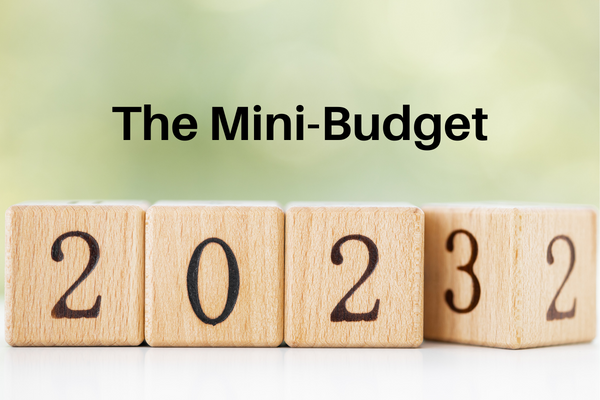The new chancellor, Kwasi Kwarteng delivered a mini-budget in the House of Commons. However, it was anything but ‘mini’. Here are all the important points that you need to know.
National Insurance
The 1.25% rise in NI rates that have applied since April 2022 will be scrapped from 6th November. The rates will then be:
- Employees’ Class 1 (primary) – 12% and 2%
- Employers’ Class 1 (secondary) – 13.8%
Additional information: Additional NI payable by employees earning over the upper earnings limit of £4,189 per month (£50,270 per year) will also be reduced by 1.25% to 2% from 6 November. For 2022/23 there will be a transitional rate of 14.53% for Class 1A and 1B NI contributions, i.e. that paid by employers on taxable benefits in kind.
Self-employed taxpayers will pay composite rates of Class 4 NI for 2022/23. The rates will be 9.73% on profits between £11,909 and £50,270 and 2.73% on profits above the upper limit. For taxpayers with annual earnings periods, e.g. directors, the rates will be 12.73% on earnings between £11,909 and £50,270, and 2.73% on higher earnings.
Income tax
The basic rate of income tax will fall to 19% from April 2023, one year earlier than previously planned. The additional rate of 45% will be scrapped altogether, so the top rate will be 40% from April 2023. This is mirrored for tax on dividends paid on or after 6 April 2023. The additional rate of 39.35% will be scrapped leaving dividends for basic rate taxpayers chargeable at 7.5% and the higher rate at 32.5%.
Corporation Tax
The increase in the main rate of corporation tax to 25%, due to apply from April 2023, has been cancelled. The main rate will remain at 19%.
The tax rate by companies who lend money to shareholders which was linked to the 1.25% NI rise in April 2022 will also be reduced.
Dividend Tax Rate
Whilst the tax-free dividend allowance is unchanged at £2,000, the increase in dividend tax rates which was applicable from April 2022 is due to be scrapped.
Stamp Duty Land Tax (SDLT)
With immediate effect, the nil-rate band has doubled from £125,000 to £250,000 for all residential property purchases. Plus, there is an immediate increase in First Time Buyers’ Relief from £300,000 to £425,000. First-time buyers will also see the maximum value of qualifying property increase to £625,000.
Annual Investment Allowance (AIA)
The Chancellor has announced that the £1 million level of AIA (which was due to end on 31 March 2023) has been made permanent. This means businesses can deduct 100% of the costs of qualifying plant and machinery up to £1 million in the first year.
Off-payroll working (IR35) reforms repealed
The changes made to the off-payroll working rules from April 2017 and April 2021 will be reversed. From 6 April 2023 the responsibility for determining employment status will revert to the individuals doing the work. This will free up time and money for businesses that engage contractors, the reform also minimises the risk that genuinely self-employed workers are impacted by the underlying off-payroll rules.
Energy Bill Relief Scheme (EBRS) for non-domestic customers
This scheme will provide energy bill relief for non-domestic customers in Great Britain. Discounts will be applied to energy usage initially between 1 October 2022 and 31 March 2023.
Suppliers will apply reductions to the bills of all eligible non-domestic customers. The government will compensate suppliers for the reduction in wholesale gas and electricity unit prices that they are passing onto non-domestic customers.
Personal Investment allowances (EIS, VCT, SEIS, CSOP)
The Chancellor set out his determination to make this country an entrepreneurial, share-owning democracy. He announced that the Enterprise Investment Scheme and the Venture Capital Trusts will be extended beyond 2025. The limits for the Seed Enterprise Investment Scheme and Company Share Option Plans will be increased to make them more generous. These schemes offer private investors generous tax benefits such as income tax relief, and exemption from capital gains tax and inheritance tax and they are a vital part of driving investment for new start-up companies.



